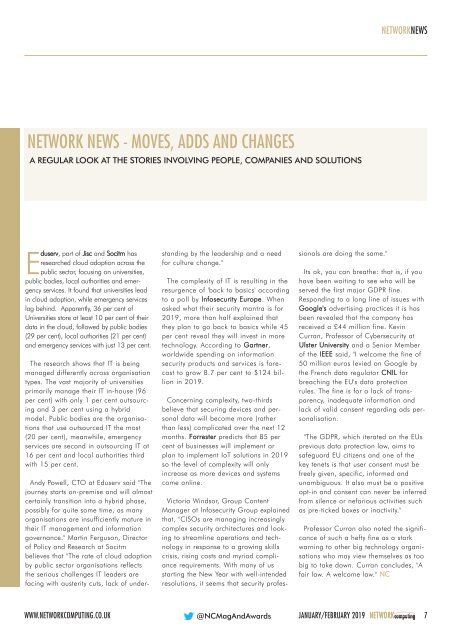NC1901
Create successful ePaper yourself
Turn your PDF publications into a flip-book with our unique Google optimized e-Paper software.
NETWORKNEWS<br />
NETWORK NEWS - MOVES, ADDS AND CHANGES<br />
A REGULAR LOOK AT THE STORIES INVOLVING PEOPLE, COMPANIES AND SOLUTIONS<br />
Eduserv, part of Jisc and Socitm has<br />
researched cloud adoption across the<br />
public sector, focusing on universities,<br />
public bodies, local authorities and emergency<br />
services. It found that universities lead<br />
in cloud adoption, while emergency services<br />
lag behind. Apparently, 36 per cent of<br />
Universities store at least 10 per cent of their<br />
data in the cloud, followed by public bodies<br />
(29 per cent), local authorities (21 per cent)<br />
and emergency services with just 13 per cent.<br />
The research shows that IT is being<br />
managed differently across organisation<br />
types. The vast majority of universities<br />
primarily manage their IT in-house (96<br />
per cent) with only 1 per cent outsourcing<br />
and 3 per cent using a hybrid<br />
model. Public bodies are the organisations<br />
that use outsourced IT the most<br />
(20 per cent), meanwhile, emergency<br />
services are second in outsourcing IT at<br />
16 per cent and local authorities third<br />
with 15 per cent.<br />
Andy Powell, CTO at Eduserv said "The<br />
journey starts on-premise and will almost<br />
certainly transition into a hybrid phase,<br />
possibly for quite some time, as many<br />
organisations are insufficiently mature in<br />
their IT management and information<br />
governance." Martin Ferguson, Director<br />
of Policy and Research at Socitm<br />
believes that "The rate of cloud adoption<br />
by public sector organisations reflects<br />
the serious challenges IT leaders are<br />
facing with austerity cuts, lack of understanding<br />
by the leadership and a need<br />
for culture change."<br />
The complexity of IT is resulting in the<br />
resurgence of 'back to basics' according<br />
to a poll by Infosecurity Europe. When<br />
asked what their security mantra is for<br />
2019, more than half explained that<br />
they plan to go back to basics while 45<br />
per cent reveal they will invest in more<br />
technology. According to Gartner,<br />
worldwide spending on information<br />
security products and services is forecast<br />
to grow 8.7 per cent to $124 billion<br />
in 2019.<br />
Concerning complexity, two-thirds<br />
believe that securing devices and personal<br />
data will become more (rather<br />
than less) complicated over the next 12<br />
months. Forrester predicts that 85 per<br />
cent of businesses will implement or<br />
plan to implement IoT solutions in 2019<br />
so the level of complexity will only<br />
increase as more devices and systems<br />
come online.<br />
Victoria Windsor, Group Content<br />
Manager at Infosecurity Group explained<br />
that, "CISOs are managing increasingly<br />
complex security architectures and looking<br />
to streamline operations and technology<br />
in response to a growing skills<br />
crisis, rising costs and myriad compliance<br />
requirements. With many of us<br />
starting the New Year with well-intended<br />
resolutions, it seems that security professionals<br />
are doing the same."<br />
Its ok, you can breathe: that is, if you<br />
have been waiting to see who will be<br />
served the first major GDPR fine.<br />
Responding to a long line of issues with<br />
Google's advertising practices it is has<br />
been revealed that the company has<br />
received a £44 million fine. Kevin<br />
Curran, Professor of Cybersecurity at<br />
Ulster University and a Senior Member<br />
of the IEEE said, "I welcome the fine of<br />
50 million euros levied on Google by<br />
the French data regulator CNIL for<br />
breaching the EU's data protection<br />
rules. The fine is for a lack of transparency,<br />
inadequate information and<br />
lack of valid consent regarding ads personalisation.<br />
"The GDPR, which iterated on the EUs<br />
previous data protection law, aims to<br />
safeguard EU citizens and one of the<br />
key tenets is that user consent must be<br />
freely given, specific, informed and<br />
unambiguous. It also must be a positive<br />
opt-in and consent can never be inferred<br />
from silence or nefarious activities such<br />
as pre-ticked boxes or inactivity."<br />
Professor Curran also noted the significance<br />
of such a hefty fine as a stark<br />
warning to other big technology organisations<br />
who may view themselves as too<br />
big to take down. Curran concludes, "A<br />
fair law. A welcome law." NC<br />
WWW.NETWORKCOMPUTING.CO.UK @NCMagAndAwards JANUARY/FEBRUARY 2019 NETWORKcomputing 7

















